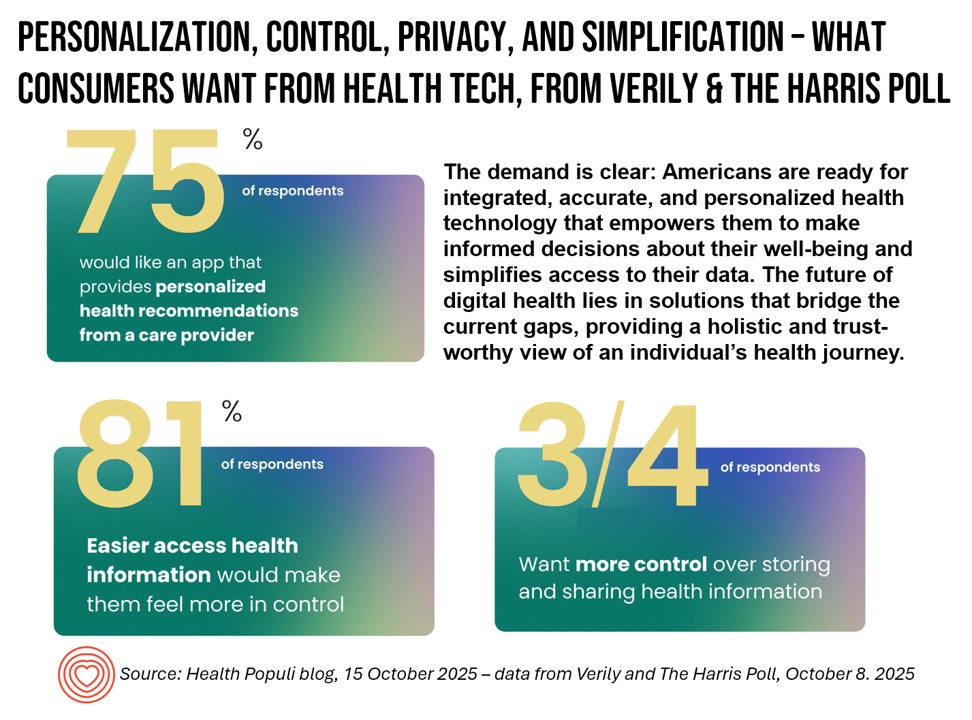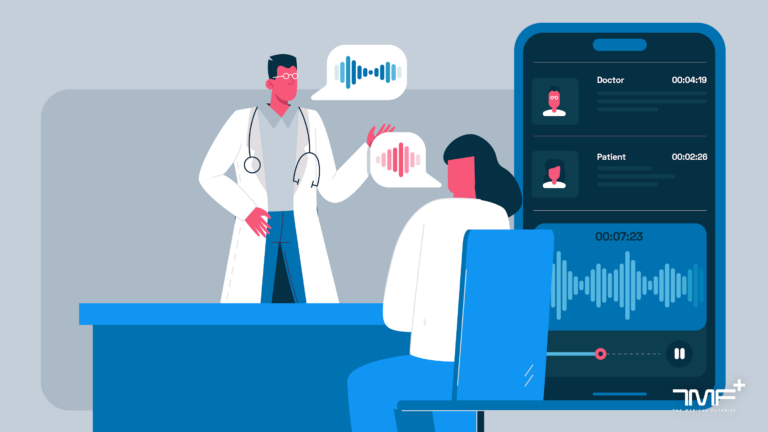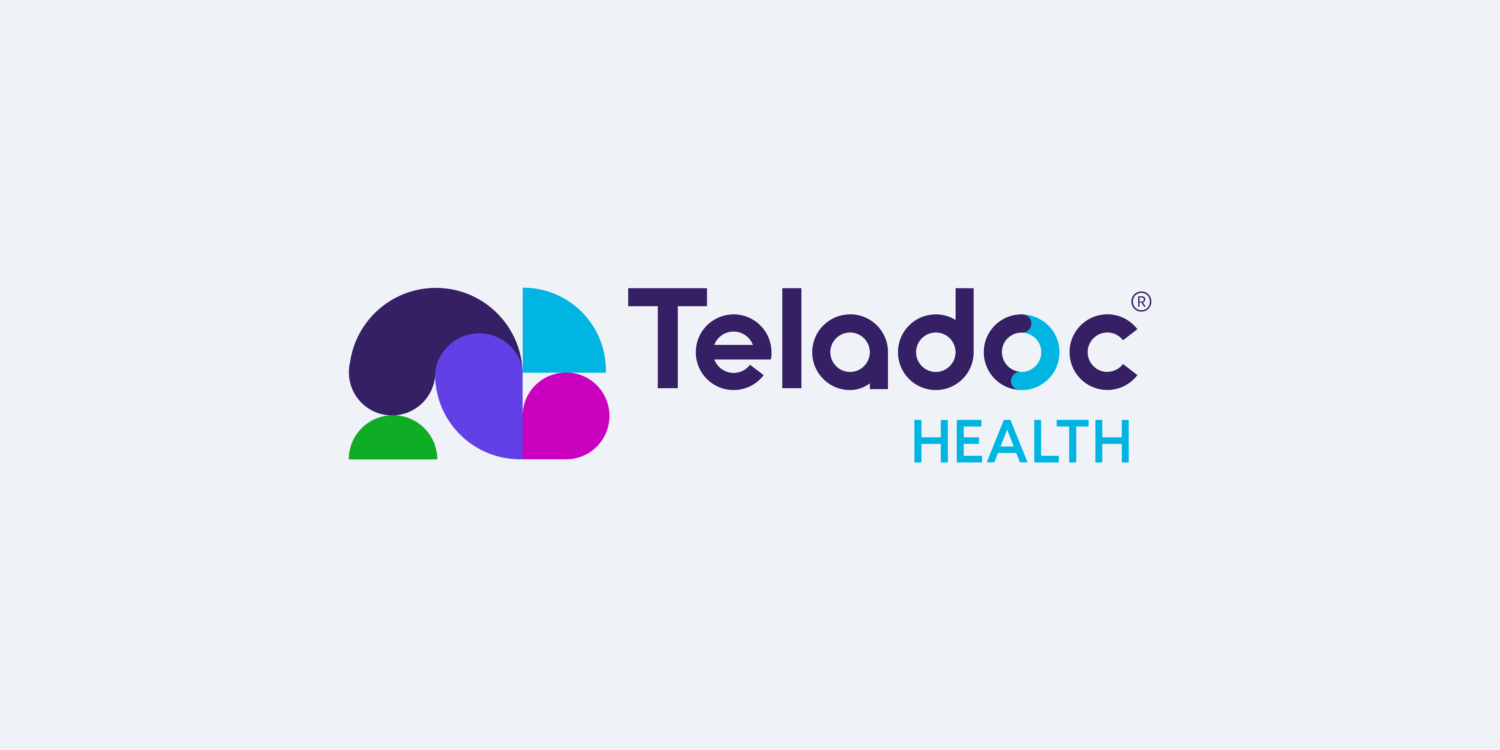HealthPopuli.com – Read More
“What do consumers want from their health technology?” wondered a poll conducted among smartphone-owning health care decision makers.
Greater control and engagement in health care, assurance of privacy and security for their health data. and greater personalization of advice coming out of the analysis of that shared personal health information.
Welcome to the Consumer Survey on Personal Health Technology, market research conducted by Verily with The Harris Poll among 2,000 U.S. adults 18 and older in July 2025. The screening criteria used to include a survey respondent were two-fold: whether they owned a smartphone, and made the majority of their health care decisions.
Verily, born in 2015 as Google Life Sciences, today characterizes its business as, “a data platform and AI company purpose-built for precision health.”

The chart shown here organizes the key themes found in the study, summarized by the report writers:
“The demand is clear: Americans are ready for integrated, accurate, and personalized health technology that empowers them to make informed decisions about their well-being and simplifies access to their data. The future of digital health lies in solutions that bridge the current gaps, providing a holistic and trustworthy view of an individual’s health journey.”
The vast majority of people in the U.S. want an app that would serve up personalized health recommendations from a health care provider; easier access to health information that would inspire a sense of personal health control and empowerment; and, more control over sharing and storing one’s personal health information to assure privacy and security.
The Verily blog reports the many details underneath these macro findings; some of the most revealing are that,
While 8 in 10 Americans say they’re in good or excellent health, over one-half are also concerned about their health.
For people dealing with health condition, 84% take medications – on average, two prescription medicines and one over-the-counter product.
On average in this study, consumers visit an average of 2.5 health care providers regularly.
Two-thirds of consumers were interested in more easily sharing their personal health app/wearable tech generated data with health care providers.
Nearly 1 in 2 consumers use a wearable health device (my note: most likely a smartwatch or, increasingly, a smart ring). Opposed to consumers’ feelings and responses to using a health information portal (lack of streamlined experience, fragmented applications, and the like), 9 in 10 wearable tech users are satisfied with the ease-of-use of their apps — “yet this satisfaction often doesn’t extend to the broader digital health ecosystem,” the Verily blog asserts.
Three in 4 consumers active seek information about healthy nutrition and lifestyle choices. again reinforcing their interest in health beyond their medical conditions.
Health Populi’s Hot Points: Verily is in the business of innovating and delivering technology solutions and actionable insights to health consumers. So their finding that “current health technology applications often miss the mark” is their, and other solutions providers’, opportunities to solve. Key points to solve for include the challenges,
- To integrate across health apps and bolster clinical accuracy
- Embed UX/CX enchanting design to ease peoples’ navigation of their health records and data
- Reduce user friction such as forgotten passwords and fragmented portals
- Assure that privacy and security are designed into the systems — making sure HIPAA’s regulatory details are attended to and, if not, advocating for broader privacy regulations that cover all manners of data that feed holistic health (such as retail data, GPS, social data, and other factors not typically covered by HIPAA agreements).
That more consumers felt satisfied and “heard” when it comes to using more novel health apps and wearable tech devices — and not health care providers’ portals — points to an opportunity for collaboration between the tech innovators and care providers who well understand workflows of clinicians. The tech companies may better comprehensive the life-flows of consumers — imagine how fruitful collaboratives could be if siloes between these stakeholders could be broken down and sleeves rolled up for the benefits of that patient-provider partnership.
The post Paging Dr. Verily – What Consumers Want from Health Tech: Personalization, Control, Privacy, and Ease appeared first on HealthPopuli.com.





